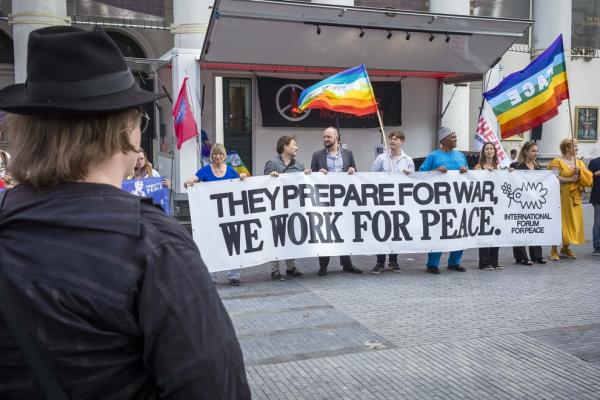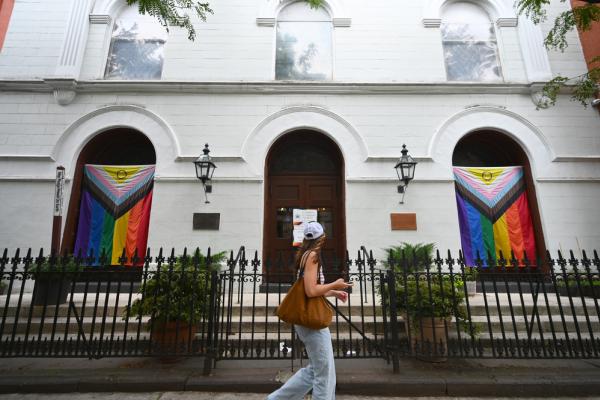On July 7, the IRS made waves when it reversed its longstanding guidance that churches must avoid partisan speech under the Johnson Amendment of the U.S. tax code.
What does this new IRS guidance mean for political engagement among progressive churches?
Progressive churches cannot cede the field of political speech out of propriety, especially if the revised IRS stance allows for more explicit partisan campaigning by conservative evangelical groups and institutions. From my perspective as an activist and active participant in my progressive faith community, I believe progressive churches must be explicit in the principles that guide their political engagement and activism. These principles should guide churches when it comes to the way they relate to power and pluralism: The church should build power, not seek power; it should practice “power-with” rather than “power-over”; and it should work in coalition with diverse groups seeking political change.
The moral crises of our current systems are too grave for churches to avoid partisan politics. As the Rev. Kira Austin-Young pointed out on Bluesky, conservative churches are likely to take advantage of their right to campaign while progressive churches are not. Why? Because, as Austin-Young observes, progressive churches have an aversion to “further fractur[ing] or polariz[ing] communities” and because “candidates are inherently flawed.” Progressive churches avoid partisan politics on account of their own values, but this will dangerously tilt power further toward conservatives.
Progressive churches are rightly concerned about equating the reign of God with a single party or political end. We have seen the horrific effects of this identification in the Christian Right. Political speech must be exercised with great care.
Rather than drawing an arbitrary line at “not endorsing candidates” or rejecting political power altogether on the grounds that all power is suspect, churches need better principles for political engagement. Churches must have clear criteria by which to judge their political activism, particularly if their clergy speak for or against particular candidates. Three criteria can help church communities discern how they relate to and use power.
The church should build power, not seek power
The church, like Christ, should not seek political power for its own sake. Speaking about electoral politics in church is uncomfortable precisely because running for office is about seeking power. While I think the church can and should speak to concerns of electoral politics, its immediate focus should be more supportive: working at the local level to meet immediate needs and build alternative systems, like mutual aid efforts, or building concretely alternative ways of living justly in community. The church should build these alternative systems alongside the official ones. This is sometimes called “dual power” in Marxist thought.
READ MORE: Obery Hendricks Thinks Marxist Analysis Can Help Christians
When building alternatives and lobbying for policy change, the church should ask: Is this activism aimed at building power, or at seeking power? Building power means bringing more people into the movement and broadening the base of support for justice-oriented policies. That’s a very different approach than simply seeking positions of influence in existing systems.
How might your church’s political action accomplish building power with people instead of building power over people?
How churches can build “power-with” rather than “power-over”
“Power-with” is a type of power that works by empowering others. Power-with is collaborative, but “power-over” is structured by domination. Brené Brown defines power-over as driven by fear and by seeing power as finite. In contrast, power-with envisions power as infinite — a resource that expands “when shared with others.” Again, the key thing is that the church isn’t engaging in politics to seek power for itself, its members, or even its own ends — no matter how good we think those ends might be. Building power-with is always about community engagement with a focus on giving power away to others for the sake of broad, justice-oriented coalitions.
Political engagement can certainly cause conflict within congregations. But healthy conflict should be embraced so long as it is handled with care and attention. The principles of building power-with rather than seeking power-over can help guide disagreements over political positions in productive and compassionate ways. Clergy who speak about politics must do so in ways that are accountable to their members and invite them to embrace a posture rooted in shared power.
The church should work in pluralistic coalitions when seeking political change
Working in coalitions is another safeguard to prevent churches mistaking political ends for the reign of God. Through coalitions, churches become accountable to other partners. This kind of collaborative work supports pluralism and diverse viewpoints all for the sake of a common goal. It provides a necessary guardrail for churches as they step into political activism.
The kingdom of God is already present, but it is not of this world (Luke 10:9; John 18:36). God’s kingdom is not one of domination or one aimed at institutional power, as the evangelical Seven Mountains Mandate claims. Nor is God’s kingdom one that only cares for spiritual needs by ignoring current political realities. The reign of God demands that the church proclaim and enact real alternatives to the death-dealing systems of our society. Those alternatives can emerge through coalitional work — including with people of other faiths or with no faith at all. The point of building this alternative community can be to advocate for policy change or to build systems of justice that exist outside of “official” channels like mutual aid networks or restorative justice circles.
Churches can and should take part in political coalitions aimed at changing governmental policies for the common good. Sometimes, those coalitions will endorse one candidate over another. It’s an imperfect compromise, but one that seems unavoidable when a single political party is primarily responsible for enacting mass deportation raids, building concentration camps, and defunding health care for the poor. Failure to speak or to take a side in these circumstances is complicity.
Churches can and should take part in political coalitions aimed at changing governmental policies for the common good. Sometimes, those coalitions will endorse one candidate over another.
Principles of power-with — rather than seeking power-over — in coalitions can guide clergy who want to make endorsements to do so responsibly. These same principles also provide a framework for clergy who do not want to make endorsements, offering different ways the church can, and must, be intimately involved in building power for justice.
Political engagement is a risk, but such a risk is necessary in these times. By remaining rigorously accountable to their own values, membership, and coalition partners about how they relate to power, progressive churches can speak and act responsibly in a time where God’s justice demands Christian political activism.
Got something to say about what you're reading? We value your feedback!




